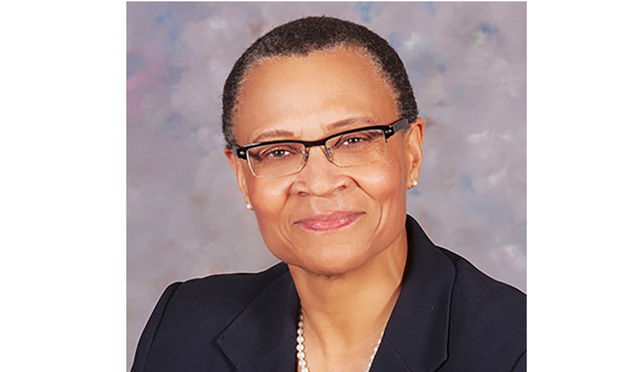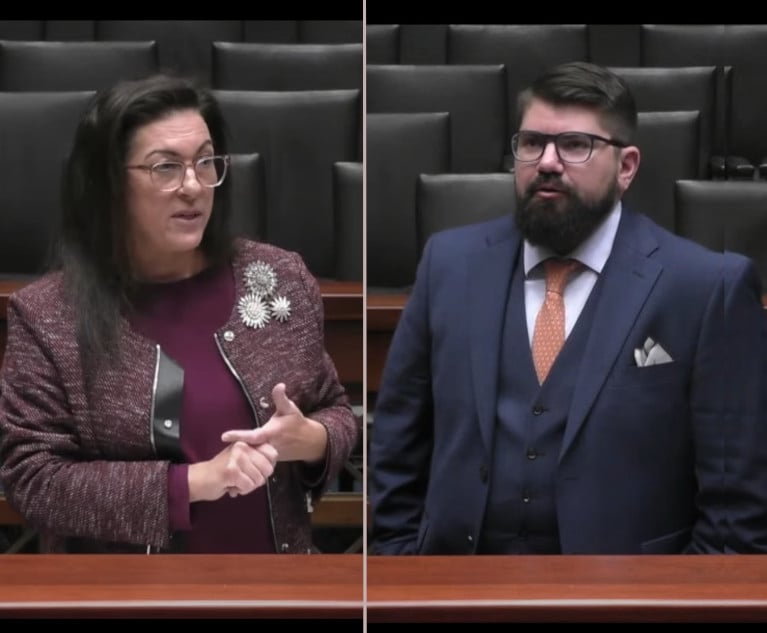UNT Dallas College of Law Names New Dean
The University of North Texas Dallas College of Law this summer will welcome Angela Felecia Epps as the new leader of the law school. Epps takes over at a critical time for the school as it works to earn full accreditation.
April 03, 2018 at 02:36 PM
6 minute read

The University of North Texas Dallas College of Law this summer will welcome Felecia Epps as the new leader at a critical time for the law school as it seeks full accreditation.
After a national search that drew applications from 30 aspiring deans, Epps will take over from founding dean Royal Furgeson, who is retiring as dean but continuing to work in a development role to keep advancing the law school.
Epps said she's honored at her appointment and excited to start working, noting that North Texas's accreditation will be her major, primary focus.
“I know already: The bar pass rate is an issue we will be working on,” she said. “Our goal, or course, we want a 100 percent pass rate–it can be an ultimate goal–but we want to at least put it up to that 75 percent.”
UNT Dallas Provost Betty Stewart said in a statement, “Her commitment to academic innovation and community-connectedness resonates with our university mission of empowering students, transforming lives and strengthening the community.”
According to her profile on Florida A&M's website, Epps earned her law degree from Creighton University School of Law in Omaha, Nebraska, in 1983. She became a commissioned second lieutenant in the U.S. Marine Corps, serving as a judge advocate for 10 years and leaving the service as a major in 1992. In 1999, Epps entered legal academia as a professor at the University of Arkansas at Little Rock William H. Bowen School of Law. Most recently, Epps, who has focused her scholarship on social and criminal justice, was a professor and dean at Florida A&M University College of Law from January 2016 to May 2017.
Epps is still a tenured professor at Florida A&M, however, the university removed her as dean last May, simultaneously removing the deans of its journalism, pharmaceutical and education programs, according to law.com. University officials didn't disclose why they removed her from the job she held only 16 months. Around the time that the university removed her as dean, the law school did suffer from poor bar passage rates: a 46 percent pass rate on the February 2017 bar exam, and a 53 percent pass rate on the July 2016 exam. Before Epps was dean, Florida A&M had already been struggling with its bar pass rate the previous nine to 10 years. Epps had said previously that the law school convened a special work group and was taking “aggressive steps to improve our bar passage rate and turn things around.”
Epps said her removal had nothing to do with the school's bar pass rate. She was making plans to improve it, but didn't have time to implement her changes. The university was undergoing leadership changes from the board of trustees down to the president and provost. The leaders who hired Epps transitioned out, and shortly afterwards, the new leadership told her they had “decided to go another direction.”
“In terms of any kinds of issues with my performance, anything specific they said I was doing wrong—there was nothing,” Epps said. “I take them at their words: they decided to take it another direction.”
The major focus for Epps will be keeping North Texas on track to win full accreditation from the American Bar Association Section of Legal Education and Admissions to the Bar. The school won provisional accreditation last summer, and now has three to five years to earn full accreditation—but it must boost its bar pass rate.
“Our real emphasis right now is getting the final ABA accreditation, and she is just almost a perfect fit for that,” Furgeson said. “She has the understanding of the ABA process and the connections with the ABA accreditors that will really serve us a good stead.”
For the July 2017 test, North Texas grads had a 59 percent pass rate, the lowest among Texas law schools. Furgeson said the school has put a lot of staff and effort into beefing up its academic support program, hoping to boost its bar pass rate. A status update will come next month when the February 2018 bar exam results come out.
Epps said she was attracted to work at North Texas because it's already been implementing steps to improve its bar pass rates, including requiring students to take multiple assessments through the school year rather than just one final exam. She's confident the school will meet the ABA's accreditation standard.
For accreditation, a law school must either have at least 75 percent of graduates from the five most recent calendar years pass a bar exam, or a 75 percent pass rate for at least three of those five years.
It was a long, hard slog for the law school to win provisional accreditation. The ABA's accreditation committee in July 2016 recommended against accreditation and raised concerns with the North Texas students' low LSAT scores, and the school's finances. The law school worked to address the committee's concerns by tightening its admission standards, which raised its LSAT scores and scrutinizing its finances. The committee approved in April 2017, and the education section granted provisional accreditation a couple of months later.
North Texas's law school was founded in 2013, with a mission to diversify the legal profession. PreLaw Magazine has recognized the school as being the third most diverse law school in the country.
Furgeson said the first question for Epps was whether she supported the school's mission to keep tuition affordable, open access to diverse students and innovate academically.
“Her answer to all of it was 100 percent—I want to be part of a law school that has those objectives,” he said.
Epps said she wanted to be North Texas's dean because of its mission to make a legal education available to students who normally wouldn't have the opportunity. Florida A&M, a historically black college or university, had a similar mission. Likewise, North Texas won't be searching for high-credential students just to boost its own rankings.
“We're interested in diversifying the legal profession,” she said.
Epps' appointment as dean helps to diversify the ranks of law deans in Texas. She becomes the second current female dean, along with Southern Methodist University Dedman School of Law Dean Jennifer Collins. She becomes the third current African-American dean, along with University of Houston Law Center Dean Leonard Baynes and Texas Southern University Thurgood Marshall School of Law Interim Dean Gary Bledsoe.
Epps said that she's made similar strides throughout her career. She was among the very few black women Marine officers, for example.
“I'm in favor of diversity in all its aspects,” she said. “It's got to be a good thing.”
Angela Morris is a freelance journalist. Follow her on Twitter at @AMorrisReports
This content has been archived. It is available through our partners, LexisNexis® and Bloomberg Law.
To view this content, please continue to their sites.
Not a Lexis Subscriber?
Subscribe Now
Not a Bloomberg Law Subscriber?
Subscribe Now
NOT FOR REPRINT
© 2025 ALM Global, LLC, All Rights Reserved. Request academic re-use from www.copyright.com. All other uses, submit a request to [email protected]. For more information visit Asset & Logo Licensing.
You Might Like
View All
'It's Like They Lynched You:' Law Professor's Discrimination Claim Reaches High Court
7 minute read


Trending Stories
- 1Drake Sues UMG for Defamation Over Promotion of False Claims of Pedophilia
- 2Quinn Emanuel Files Countersuit Against DOJ in Row Over Premerger Reporting
- 3High Court Rejects 'Heightened' Standard for Employers Defending FLSA Cases
- 4Case With 'Serious Consequences for Corporate Law' Heads to Texas Supreme Court
- 5Oil Co. Alleges Plot to Drive Away Competition in NYC's Liquid Fuel Market
Who Got The Work
J. Brugh Lower of Gibbons has entered an appearance for industrial equipment supplier Devco Corporation in a pending trademark infringement lawsuit. The suit, accusing the defendant of selling knock-off Graco products, was filed Dec. 18 in New Jersey District Court by Rivkin Radler on behalf of Graco Inc. and Graco Minnesota. The case, assigned to U.S. District Judge Zahid N. Quraishi, is 3:24-cv-11294, Graco Inc. et al v. Devco Corporation.
Who Got The Work
Rebecca Maller-Stein and Kent A. Yalowitz of Arnold & Porter Kaye Scholer have entered their appearances for Hanaco Venture Capital and its executives, Lior Prosor and David Frankel, in a pending securities lawsuit. The action, filed on Dec. 24 in New York Southern District Court by Zell, Aron & Co. on behalf of Goldeneye Advisors, accuses the defendants of negligently and fraudulently managing the plaintiff's $1 million investment. The case, assigned to U.S. District Judge Vernon S. Broderick, is 1:24-cv-09918, Goldeneye Advisors, LLC v. Hanaco Venture Capital, Ltd. et al.
Who Got The Work
Attorneys from A&O Shearman has stepped in as defense counsel for Toronto-Dominion Bank and other defendants in a pending securities class action. The suit, filed Dec. 11 in New York Southern District Court by Bleichmar Fonti & Auld, accuses the defendants of concealing the bank's 'pervasive' deficiencies in regards to its compliance with the Bank Secrecy Act and the quality of its anti-money laundering controls. The case, assigned to U.S. District Judge Arun Subramanian, is 1:24-cv-09445, Gonzalez v. The Toronto-Dominion Bank et al.
Who Got The Work
Crown Castle International, a Pennsylvania company providing shared communications infrastructure, has turned to Luke D. Wolf of Gordon Rees Scully Mansukhani to fend off a pending breach-of-contract lawsuit. The court action, filed Nov. 25 in Michigan Eastern District Court by Hooper Hathaway PC on behalf of The Town Residences LLC, accuses Crown Castle of failing to transfer approximately $30,000 in utility payments from T-Mobile in breach of a roof-top lease and assignment agreement. The case, assigned to U.S. District Judge Susan K. Declercq, is 2:24-cv-13131, The Town Residences LLC v. T-Mobile US, Inc. et al.
Who Got The Work
Wilfred P. Coronato and Daniel M. Schwartz of McCarter & English have stepped in as defense counsel to Electrolux Home Products Inc. in a pending product liability lawsuit. The court action, filed Nov. 26 in New York Eastern District Court by Poulos Lopiccolo PC and Nagel Rice LLP on behalf of David Stern, alleges that the defendant's refrigerators’ drawers and shelving repeatedly break and fall apart within months after purchase. The case, assigned to U.S. District Judge Joan M. Azrack, is 2:24-cv-08204, Stern v. Electrolux Home Products, Inc.
Featured Firms
Law Offices of Gary Martin Hays & Associates, P.C.
(470) 294-1674
Law Offices of Mark E. Salomone
(857) 444-6468
Smith & Hassler
(713) 739-1250






